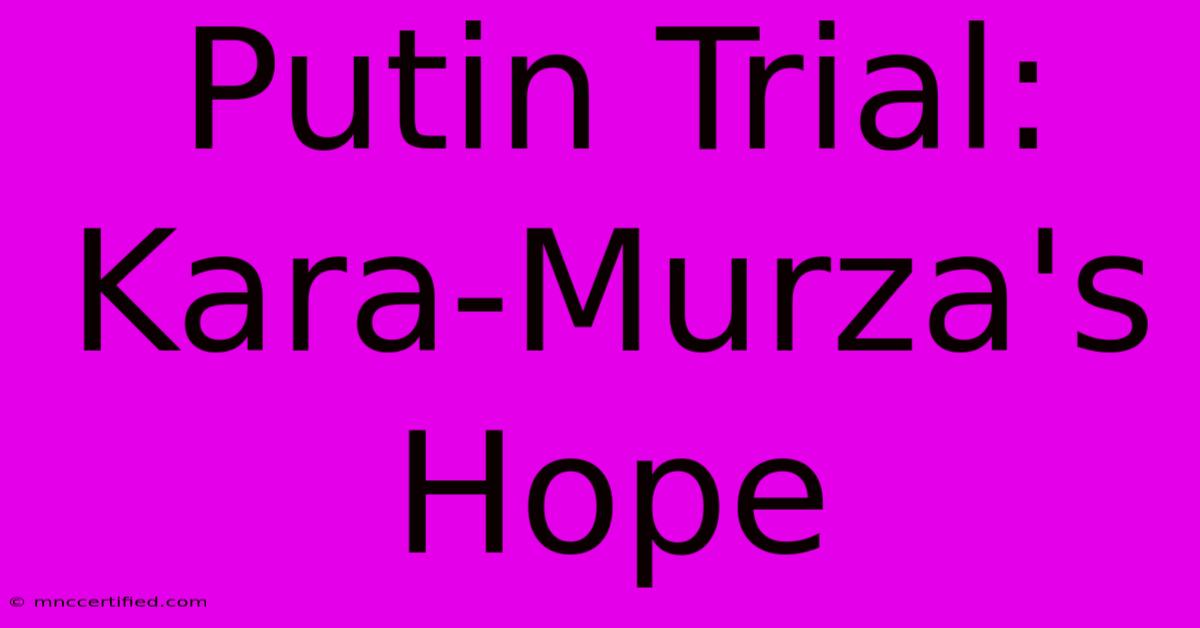Putin Trial: Kara-Murza's Hope

Table of Contents
Putin Trial: Kara-Murza's Hope for Justice and Accountability
Vladimir Kara-Murza, a prominent Russian opposition figure and vocal critic of Vladimir Putin, stands trial in Moscow, facing charges that carry a potential 25-year prison sentence. This trial is not merely a legal proceeding; it's a stark symbol of the ongoing crackdown on dissent within Russia and a crucial test of the international community's commitment to accountability for human rights abuses. This article explores the implications of Kara-Murza's case, the hopes for justice, and the broader context of political repression in Russia.
The Charges Against Kara-Murza: A Fabricated Narrative?
Kara-Murza faces charges of "high treason" and spreading "false information" about the Russian military, accusations widely viewed as politically motivated. His supporters, including numerous international human rights organizations, contend that these charges are a direct consequence of his outspoken criticism of the Kremlin and its actions, particularly the war in Ukraine. The lack of transparency surrounding the trial and the evident suppression of dissenting voices fuel concerns about a predetermined outcome. The "false information" charge, often used to silence dissent, highlights the chilling effect on freedom of speech within Russia. The "high treason" charge, a particularly serious offense, carries the weight of decades in prison, effectively silencing a powerful voice of opposition for years to come.
International Condemnation and Calls for Intervention
The international community has largely condemned Kara-Murza's trial, with numerous governments and organizations expressing deep concern about the lack of due process and the blatant political nature of the charges. The European Union, the United States, and the United Kingdom, among others, have called for his immediate release and have imposed sanctions on Russian officials involved in the repression of dissent. These sanctions, while symbolically important, have yet to significantly impact the Kremlin's actions, highlighting the challenges in holding powerful authoritarian regimes accountable. However, continued international pressure remains crucial in preventing further human rights violations and demonstrating solidarity with those fighting for freedom of speech and expression in Russia.
Hope for Justice: The Role of International Pressure
Despite the grim realities of the situation, there remains a glimmer of hope for justice in Kara-Murza's case. The sustained international attention and condemnation serve as a powerful deterrent and can influence the trial's outcome, however indirectly. The sheer volume of international pressure could potentially encourage a more moderate sentence or even a reversal of the charges. Furthermore, documenting the trial's proceedings meticulously, including any violations of due process, provides a critical record that can be used to further expose the Kremlin's actions and build future accountability mechanisms.
The Importance of Documentation and Transparency
The meticulous documentation of the trial is crucial. Reports from international human rights organizations, eyewitness accounts, and any leaked information will become essential components of the historical record, illustrating the extent of political repression under Putin's regime. This documentation not only serves as evidence for future legal proceedings but also helps to shape public opinion and maintain pressure on the Russian government. The transparency or lack thereof in the trial itself is also a significant factor – a secretive trial fuels suspicion and reinforces the belief in a predetermined outcome.
Beyond Kara-Murza: The Broader Context of Repression in Russia
Kara-Murza's case is not an isolated incident. It's a symptom of a broader crackdown on dissent in Russia, characterized by the suppression of independent media, the imprisonment of political opponents, and the systematic dismantling of civil society. Understanding this broader context is vital in appreciating the significance of Kara-Murza's trial and the implications for the future of human rights in Russia. The suppression of dissent within Russia represents a significant threat to democratic values globally, highlighting the interconnectedness of human rights issues across borders.
Looking Ahead: Maintaining International Pressure and Solidarity
The outcome of Kara-Murza's trial will have far-reaching consequences. A harsh sentence will undoubtedly embolden the Kremlin to continue its repressive policies, while a more lenient outcome could potentially signify a shift in approach, although this remains unlikely. Maintaining international pressure, supporting independent journalism, and continuing to document human rights abuses within Russia are all crucial steps in promoting accountability and upholding the values of justice and freedom of speech. The international community must remain vigilant and committed to supporting those who bravely challenge authoritarian rule, offering a crucial lifeline of hope in the face of oppression. The fight for justice for Vladimir Kara-Murza is a fight for justice for all those silenced under authoritarian regimes worldwide.

Thank you for visiting our website wich cover about Putin Trial: Kara-Murza's Hope. We hope the information provided has been useful to you. Feel free to contact us if you have any questions or need further assistance. See you next time and dont miss to bookmark.
Featured Posts
-
Kansas State Loss 5 Key Takeaways
Nov 17, 2024
-
Chemical Bonding Pogil Answer Key
Nov 17, 2024
-
Free Tv Hugh Grants Career Launch
Nov 17, 2024
-
Bo Nickals Ufc 309 Victory
Nov 17, 2024
-
Arizona State Upsets Kansas State
Nov 17, 2024